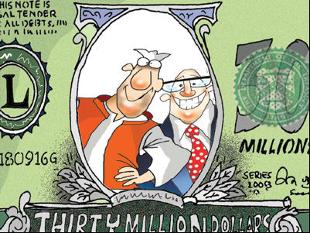
Sixteen months ago, when Virginia Governor Bob McDonnell and his Maryland counterpart Martin O’Malley visited India on near-simultaneous trade missions, it was a showcase of American federalism at its best.
Sixteen months ago, when Virginia Governor
Governors, as chief executives, are largely responsible for running their states' economies in the US. Because of the highly decentralised nature of the US system, state leaders like McDonnell and O'Malley have a lot of leeway when it comes to wooing
A case in point is a recent event hosted by the Confederation of Indian Industries in Washington, where as many as nine governors shared the stage. While their presence alone was a big statement on the importance they attach to investments from India, each governor made compelling cases for investing in his or her state.
In post-liberalisation India, a similar trend may be happening, with more and more chief ministers donning the mantle of being the economic ambassadors of their states. The leader of this pack, at the moment, is
Many chief ministers are trying to replicate Modi's success, among them is
Trade Union
Perhaps the first chief minister to realise the importance of foreign investments was Chandrababu Naidu, who turned Hyderabad into Cyberabad by attracting global IT brands to the city. SM Krishna too had similarly opened
Most states no longer think that making pitches for foreign investments is the prerogative of the Central government alone, as is evident from the number of trade missions that they sent abroad. In Washington alone, the
Two of the delegations were led by chief ministers: Arunachal Pradesh's Nabam Tuki and Madhya Pradesh's Shivraj Singh Chouhan. A third chief minister, Akhilesh Yadav of Uttar Pradesh, is scheduled to be the chief guest at this year's USIBC annual conference. In fact, this would not be Yadav's first interaction with American business leaders.
Earlier, he hosted a USIBC delegation in Lucknow, barely hours before the USIBC delegation landed in the state capital, another high-profile guest from the US was also in town: World Bank president Jim Yong Kim. The CM sought from the Bank $3.5 billion over the next several years in improving the state's dilapidated infrastructure, electricity generation and waste management.
In many ways, Yadav and others are borrowing a page from the book of Modi, who has been adept at courting domestic and international investors.
No doubt investors are pleased about the new-found enthusiasm of chief ministers to welcome them. Most businesses find not having to deal with the bureaucracy in New Delhi very refreshing. India's licence raj may be history in theory, but many international business leaders find that, in practice, it is very much alive and kicking. So from the investors' standpoint, by dealing with states directly, they can save a lot of time and money.
The writer is a Washington-based businessman and author